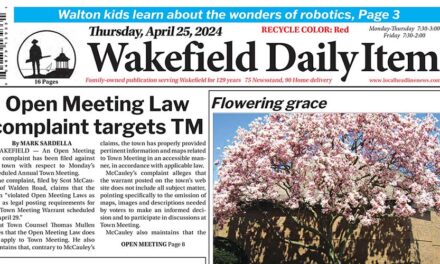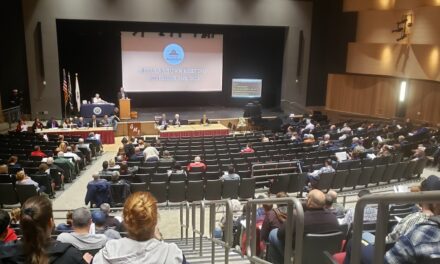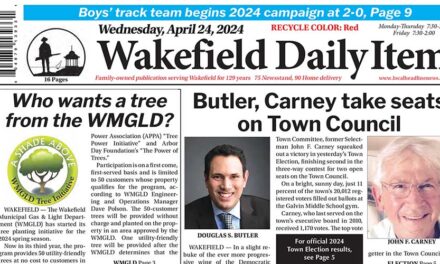Published in the February 2, 2017 edition.
By MARK SARDELLA
Today would be Curtis Guild’s birthday.
Who the hell is Curtis Guild, you ask?
How soon we forget. He was a three-term Massachusetts governor, from 1906 to 1909.
If you’ve never heard the name Curtis Guild, apparently the striping on the Route 129 Rotary has you so confused that you’ve never taken a right onto Haverhill Street where you’ll shortly come upon Camp Curtis Guild, a Massachusetts National Guard camp named after the former governor.
Curtis Guild, Jr. was born in Boston on Feb. 2, 1860, so he would be 157 years old today. Unfortunately, he came up about a century short. He didn’t even live to see his 56th birthday, dying on April 6, 1915.
But he led an interesting life.
Curtis Guild, Jr. was a blueblood’s blueblood, a Yankee’s Yankee. His mother, Sarah Crocker, could trace her ancestry back to a Revolutionary War veteran. His father, Curtis Guild, Sr., was descended from John Guild, who settled Dedham in 1636.
After attending private school, Curtis Guild, Jr. joined his fellow Boston Brahmins at Harvard College, graduating with high honors in 1881. While at Harvard, he wrote for the Harvard Crimson and the Harvard Lampoon. At Harvard, Guild met and became friends with future president Teddy Roosevelt.
After college he enjoyed a successful business career, eventually taking over his father’s newspaper in 1902. Meanwhile, Guild entered politics at an early age, becoming a member of the Massachusetts House of Representatives in 1881.
Guild was part of Teddy Roosevelt’s progressive wing of the Republican Party. Under Guild’s administration as governor, Massachusetts required medical inspections of school children, and passed a corrupt practices bill banning corporate contributions to political campaigns. Night work for women and children was banned, a state-run employment service was started and regulations governing inspection of factories for health and labor violations were strengthened.
Communications companies and natural gas distributors were also placed under state regulation. Guild also made a number of distinctive appointments. He appointed the state’s first Italian-American judges, two Jewish judges and an African-American court clerk.
While reading about Curtis Guild, I was struck by similarities in his story and that of another Massachusetts Governor that most of us are more familiar with: Charlie Baker.
Like his gubernatorial predecessor, Gov. Baker is of English descent, tracing his family roots back to the Colonial era. Curtis Guild, Jr. was named after his father but he was a piker in that regard compared to our current governor, who is the fourth in his family to bear the name Charles Baker.
Like Guild, Charlie Baker graduated from Harvard and followed that up with a successful business career.
While Guild and Baker were members of the Republican Party, their moderate politics landed them both in hot water with more conservative Republicans.
But that’s probably where the similarities end.
It’s safe to say, for example, that nobody ever demanded that Curtis Guild apologize for his “white privilege.”
There are also no reports of Guild ever taking flak for not attending demonstrations where women wear pink kitty hats and dress as female body parts. (I wonder if it ever occurred to the Ladies March organizers that Governor Baker might have had a good reason for missing the recent protests. Perhaps his pink hat was in the wash or maybe he had lost his safety pin.)
During his tenure as governor, Guild never faced repeated demands that he “disavow” then President Teddy Roosevelt – a member of his own party. Baker, on the other hand, has had to hear constant, hysterical demands that he disavow a fellow Republican, President Donald Trump, even though he neither supported Trump nor voted for him.
Baker managed to get elected as a Republican in Massachusetts, but for all of Guild’s progressive views, he could never win a statewide election in present day Massachusetts.
For one thing, Guild was into guns, big time. He was a member of Harvard’s Rifle Corps in 1879. I’m going to go out on a limb and guess that Harvard no longer has a Rifle Corps.
From his student days on, Guild was also a member of military organizations. When the Spanish-American War broke out, he immediately volunteered, serving in Havana during the occupation of Cuba. In today’s People’s Republic of Massachusetts, that would get him labeled an imperialist crusader, if not a baby-killer.
On the other hand, in 1910 President William Howard Taft named Guild Special Ambassador to the Mexican Centennial, which would certainly earn him brownie points in today’s Massachusetts. But then, in 1911 Taft appointed him as U.S. Ambassador to Russia and that wouldn’t sit too well at all today.
Oh well, it just goes to show that some things never change and you can’t please everybody – especially if you’re a Republican in Massachusetts.
Happy 157th, Governor Curtis Guild!





